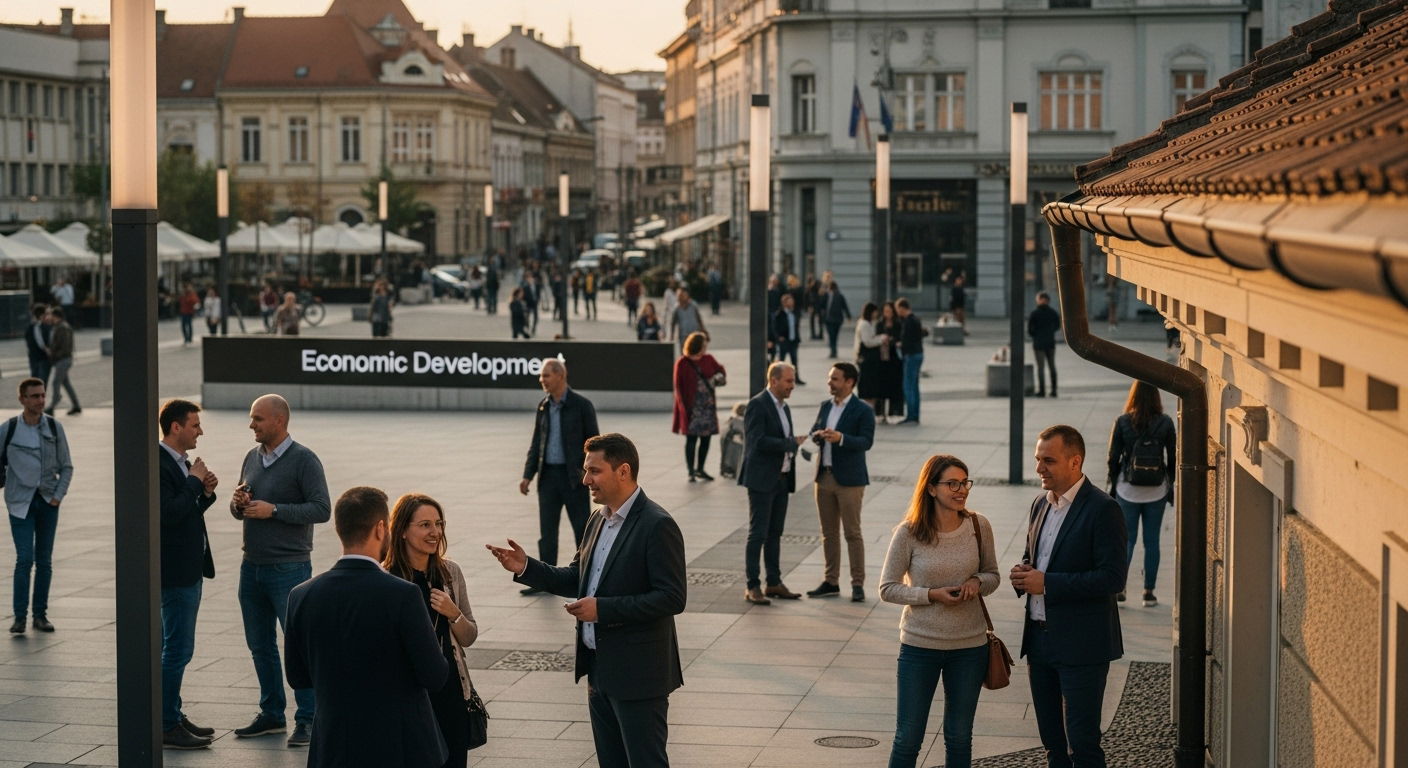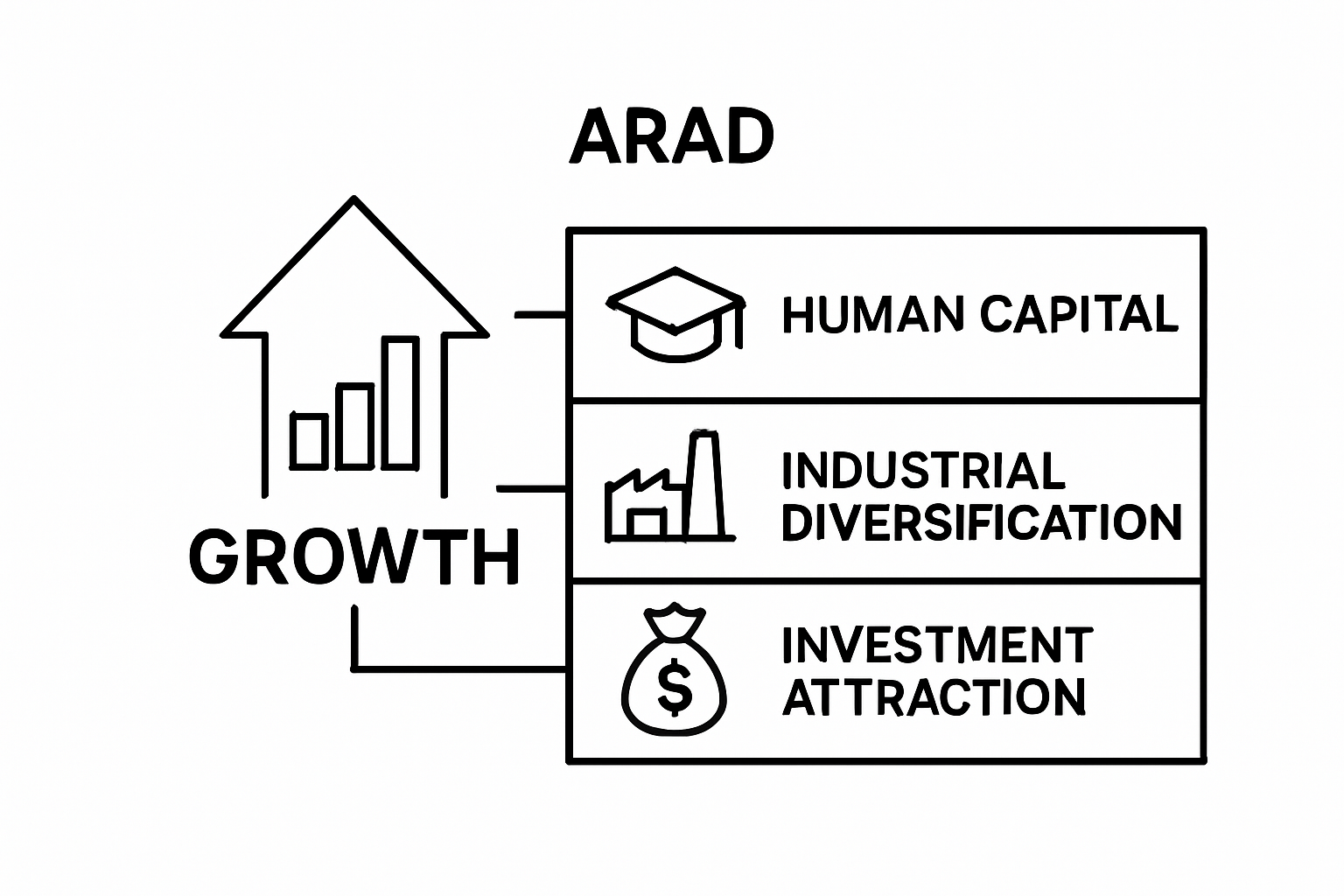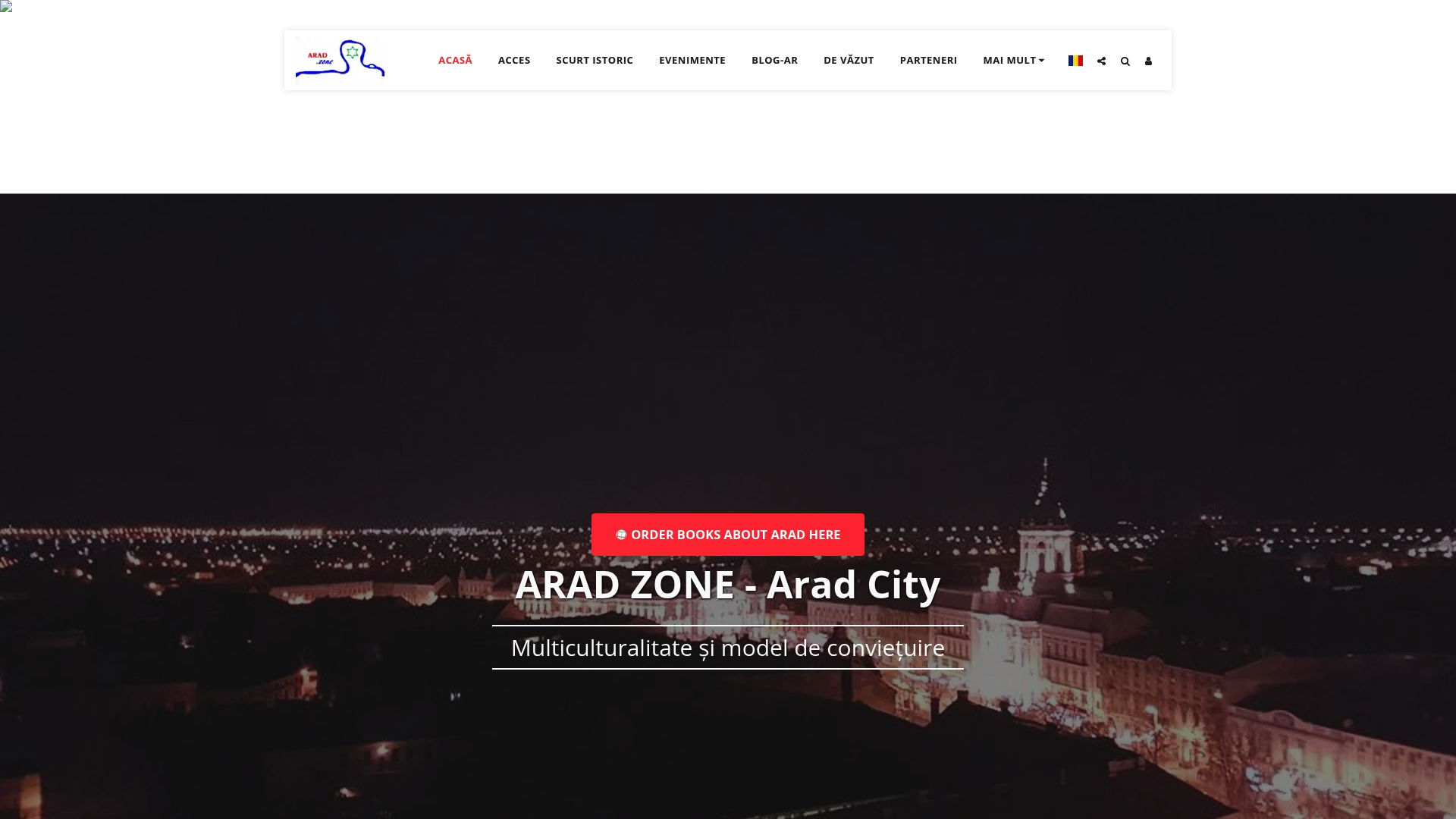Understanding Economic Development in Arad

Economic development in Arad goes far beyond numbers on a spreadsheet. The city sits near the Hungarian border and has seen a major shift from old-school manufacturing to technology-driven industries over just a few decades. Most cities struggle to catch up with this kind of rapid change. Yet Arad has quietly turned its location and growing talent pool into real economic momentum that surprises even seasoned analysts.
Table of Contents
- What Is Economic Development In Arad?
- Understanding Economic Context
- Drivers Of Economic Transformation
- Why Economic Development Matters For Arad
- Socioeconomic Impact And Community Resilience
- Strategic Economic Transformation
- Key Drivers Of Economic Development In Arad
- Institutional And Human Capital Infrastructure
- Industrial Diversification And Investment Attraction
- Challenges And Opportunities In Arad's Economy
- Territorial Economic Disparities
- Strategic Economic Transformation Opportunities
- The Future Of Economic Development In Arad
- Technological Innovation And Economic Adaptation
- Strategic Regional Integration And Collaboration
Quick Summary
| Takeaway | Explanation |
|---|---|
| Diversification drives growth in Arad | Economic development in Arad relies on diversifying its industrial sectors to enhance resilience and adaptability. |
| Education is key for skilled workforce | Strong educational institutions create a capable workforce to meet evolving market demands in Arad. |
| Leveraging geography boosts collaboration | Arad's strategic position near the Hungarian border facilitates cross-border economic initiatives and investment opportunities. |
| Technological innovation is essential | Investing in technological advancements is critical for Arad to foster sustainable economic growth and adaptability. |
| Holistic approach to development matters | Economic growth in Arad should address social, infrastructural, and technological advancements for comprehensive community progress. |
What is Economic Development in Arad?
Economic development in Arad represents a multifaceted process of sustainable growth and transformation that extends beyond traditional economic metrics. Located in Western Romania, Arad exemplifies a dynamic urban center experiencing significant economic transitions since the late 20th century.
Understanding Economic Context
Economic development in Arad encompasses strategic improvements in local economic structures, productivity, and overall quality of life. This process involves complex interactions between local industries, human capital, infrastructure, and regional economic policies. The city's strategic location near the Hungarian border provides unique opportunities for cross-border economic collaboration and investment.Key characteristics of Arad's economic development include:
- Diversification of industrial sectors
- Enhancement of technological capabilities
- Attraction of foreign direct investments
- Development of small and medium-sized enterprises
- Continuous workforce skill upgrading
Drivers of Economic Transformation
The economic landscape of Arad has been significantly shaped by several critical factors. According to research from the University of Vasile Goldiș Arad, economic complexity and human capital play pivotal roles in driving sustainable development. The city has progressively shifted from traditional manufacturing towards more knowledge-intensive and service-oriented economic activities.Particular emphasis has been placed on sectors such as automotive manufacturing, food processing, textile production, and emerging technology services. These industries have contributed to creating a more resilient and adaptable economic ecosystem that can respond effectively to global market dynamics.The transformation of Arad's economic landscape reflects a broader narrative of regional development in Western Romania. By leveraging its geographical advantages, educational institutions, and entrepreneurial spirit, Arad continues to position itself as a competitive economic hub with significant potential for future growth and innovation.
Why Economic Development Matters for Arad
Economic development is crucial for Arad as it represents a strategic pathway towards sustainable urban transformation, regional competitiveness, and improved quality of life for its residents. More than just increasing economic output, it encompasses holistic progress that addresses social, technological, and infrastructural advancements.
Socioeconomic Impact and Community Resilience
The significance of economic development extends far beyond financial metrics. According to research from the World Bank, effective economic strategies can fundamentally reshape urban landscapes by creating opportunities and reducing territorial disparities.Key community benefits include:
- Job creation across diverse sectors
- Reduction of economic inequality
- Enhanced infrastructure development
- Improved public services and amenities
- Increased social mobility and educational opportunities
Strategic Economic Transformation
Economic development in Arad serves as a critical mechanism for adapting to global economic shifts. By fostering innovation, attracting investments, and supporting entrepreneurial ecosystems, the city can build a more resilient and dynamic economic environment.The process involves strategic investments in human capital, technological infrastructure, and creating an attractive business ecosystem. This approach helps Arad transition from traditional industrial models to more knowledge-intensive and service-oriented economic structures.Ultimately, economic development is about creating a sustainable future where economic growth aligns with social progress, environmental responsibility, and the aspirations of Arad's residents. By continuously evolving and adapting, Arad can position itself as a competitive and attractive urban center in Western Romania.
Key Drivers of Economic Development in Arad
Economic development in Arad is propelled by a complex interplay of strategic factors that transform the city's economic landscape. These drivers represent interconnected elements that collectively shape the region's potential for sustainable growth and innovation.
Institutional and Human Capital Infrastructure
The foundation of Arad's economic development rests on its robust institutional framework and human capital. Educational institutions play a critical role in creating a skilled workforce capable of meeting emerging market demands. According to research on territorial development, the region's economic potential is closely linked to its capacity to develop and retain talented professionals.Key institutional drivers include:

- Strong vocational training programs
- University partnerships with local industries
- Continuous professional development initiatives
- Research and innovation support systems
- Strategic workforce skill alignment
Industrial Diversification and Investment Attraction
Arad's economic development is significantly driven by its ability to diversify industrial sectors and attract strategic investments. The city has successfully transitioned from traditional manufacturing to more advanced, technology-oriented industries. This transformation involves creating an attractive business environment that encourages both local entrepreneurship and foreign direct investments.Critical sectors driving economic growth include automotive manufacturing, food processing, textile production, and emerging technology services. By developing a flexible and adaptive economic ecosystem, Arad positions itself as an attractive destination for businesses seeking strategic regional opportunities.

The synergy between institutional capacity, industrial innovation, and strategic investments creates a dynamic environment that continually propels Arad's economic development. This multifaceted approach ensures the city remains competitive, resilient, and prepared for future economic challenges and opportunities.
Challenges and Opportunities in Arad's Economy
Arad's economic landscape is characterized by a dynamic interplay of complex challenges and promising opportunities that shape its developmental trajectory. Understanding these factors is crucial for crafting strategic approaches to sustainable economic growth.
Territorial Economic Disparities
The economic development of Arad is not uniform across its geographical regions. According to research on territorial disparities, significant variations exist between different administrative units, presenting both challenges and potential for targeted interventions.Key territorial challenges include:
- Uneven economic development across different regions
- Limited infrastructure in rural and peripheral areas
- Demographic shifts and potential workforce depletion
- Varying levels of technological adoption
- Differences in educational and skill development opportunities
Strategic Economic Transformation Opportunities
Despite the challenges, Arad possesses significant opportunities for economic revitalization. The city's strategic location near the Hungarian border, robust educational institutions, and emerging technological sectors provide a strong foundation for future growth.Promising opportunities for economic development include:
- Cross-border economic collaboration
- Attraction of foreign direct investments
- Development of high-value technology and service sectors
- Leveraging regional educational expertise
- Sustainable industrial modernization
The future of Arad's economy hinges on its ability to address existing challenges while strategically capitalizing on emerging opportunities. By implementing targeted policies, fostering innovation, and maintaining a flexible economic approach, Arad can transform potential obstacles into pathways for sustainable economic development and regional competitiveness.Below is a table summarizing the main challenges and opportunities relating to Arad's economic landscape for easy comparison and reference.
| Challenge | Description | Opportunity | Description |
|---|---|---|---|
| Uneven regional development | Varying growth across different areas | Cross-border collaboration | Partnerships facilitated by proximity to the Hungarian border |
| Limited rural infrastructure | Insufficient resources in rural and peripheral sectors | Foreign direct investment | Growing interest from international investors |
| Workforce depletion | Demographic trends threatening sustained talent supply | High-value technology sectors | Potential in expanding technology and service industries |
| Varying technological adoption | Some areas lag in implementing new technologies | Educational expertise | Regional universities supporting workforce and innovation |
| Differences in skill development | Disparities in access to quality education and training | Industrial modernization | Transitioning traditional sectors for long-term resilience |
The Future of Economic Development in Arad
The future of economic development in Arad represents a complex journey of strategic transformation, technological innovation, and adaptive resilience. As the region navigates increasingly complex global economic landscapes, its potential for sustainable growth hinges on forward-thinking strategies and integrated development approaches.
Technological Innovation and Economic Adaptation
Technological innovation emerges as a critical driver of Arad's economic future. According to research examining governmental interventions in technological performance, strategic investments in education and technological infrastructure can significantly enhance economic development potential.Key technological focus areas include:
- Advanced manufacturing technologies
- Digital transformation of traditional industries
- Artificial intelligence and machine learning applications
- Sustainable technology development
- Enhanced digital infrastructure and connectivity
Strategic Regional Integration and Collaboration
Arad's economic future will be characterized by increasingly interconnected regional and cross-border collaborations. The city's geographical positioning near the Hungarian border provides unique opportunities for developing integrated economic ecosystems that transcend traditional administrative boundaries.Strategic collaborative approaches involve:
- Joint economic development initiatives
- Shared research and innovation platforms
- Cross-border investment attraction strategies
- Integrated workforce development programs
- Synchronized industrial policy frameworks
The trajectory of Arad's economic development will depend on its ability to balance technological innovation, human capital development, and adaptive policy frameworks. By embracing complexity, fostering interdisciplinary collaboration, and maintaining a forward-looking perspective, Arad can transform potential challenges into opportunities for sustainable and inclusive economic growth.
Experience Arad’s Economic Transformation Up Close
Curious how Arad is turning economic challenges like workforce shifts and industrial transformation into real community opportunities? Discover how the city, with its rich multicultural heritage and borderland advantage, is attracting innovation and investment. If you want to see what sustainable growth looks like on the ground and find insider stories behind the headlines, you belong at Arad.zone.

See the process in action—from knowledge-driven industries to real stories about small businesses, technology evolution, and cross-border collaboration. Whether you are looking to understand more about territorial disparities or explore hidden opportunities for economic development, our books and blog reveal how Arad’s progress can inspire your own journey. Take your next step and dive deep into Arad’s unique economic story at Arad.zone. Visit now to see how transformation really happens.
Frequently Asked Questions
What is economic development in Arad?
Economic development in Arad refers to the process of sustainable growth and transformation that improves local economic structures, productivity, and quality of life. It involves diversification of industrial sectors, enhancement of technological capabilities, and attraction of foreign direct investments.
What are the key drivers of economic development in Arad?
Key drivers include institutional and human capital infrastructure, industrial diversification, innovation, and strategic investments. Educational institutions play a vital role in developing a skilled workforce that meets market demands, while diverse industries help attract investments.
How does economic development impact the community in Arad?
Economic development creates job opportunities, reduces economic inequality, enhances infrastructure, and improves public services. It significantly contributes to social mobility and educational opportunities for residents, fostering overall community resilience and well-being.
What challenges does Arad face in its economic development?
Arad faces challenges such as uneven economic development across regions, limited infrastructure in rural areas, demographic shifts leading to workforce depletion, and disparities in educational and skill development opportunities. Addressing these challenges is essential for sustainable economic growth.